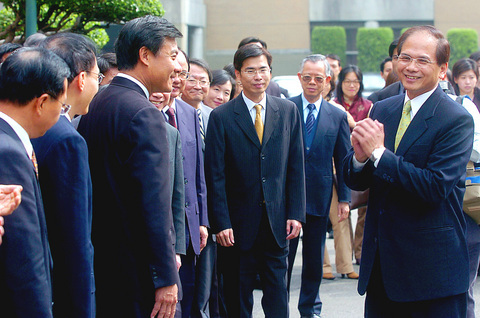Premier Yu Shyi-kun yesterday led the Executive Yuan in a mass resignation, paving the way for a new Cabinet, which will most likely be led by Kaohsiung Mayor Frank Hsieh (
When dogged by the media about the prospect of his assuming the premiership, Hsieh yesterday said that he has not yet been officially informed of the decision.

PHOTO: SEAN CHAO, TAIPEI TIMES
"I'm as curious as everybody, and I don't know many things until I read the newspaper," he said.
Yu, during his farewell speech yesterday morning, likened his Cabinet team to Shaolin monks, saying that he was glad he and his team passed the challenge of the "18 Bronze Men," which he said was a test only the most skillful Shaolin monks can pass to move on to the highest level of martial arts.
Yu made the remarks during a provisional weekly Cabinet meeting -- the final meeting in his tenure.
Although the road to reform is long and shaky, Yu said, he was proud that he and his team managed to lead the nation out of difficulties at a critical time.
Yu also likened his team to a relay team passing the Olympic torch.
"Under the leadership of President Chen Shui-bian (
In addition to expressing his personal gratitude to his colleagues, Yu outlined the achievements made over the past three years during his premiership.
When he took the office in February 2002, Yu said that the economic growth rate for 2001 was minus 2.22 percent.
That figure, however, jumped to last year's estimated 5.93 percent -- the best in seven years. The jobless rate for last year also dropped to 4.44 percent -- the lowest since 2001.
Meanwhile, President Chen Shui-bian (
"I will make a significant announcement [about the new Cabinet] tomorrow morning at 9am, so I hope all of you can get up early and make the news conference," Chen said yesterday.
Chen implied that he might announce all the details about the new Cabinet.
"But maybe we could talk about something else during our journey to Palau," Chen said.
Chen is scheduled to embark on a five-day diplomatic trip to Palau and the Solomon Islands from Thursday, and will spend two days attending Palauan President Tommy Remengesau's inauguration and visiting the Rock Islands, a tourist attraction, as well as hosting a dinner for Taiwanese expatriates.
Hsieh, who is almost certain to take over as the new premier, was tight-lipped about the new post, saying only that he "cherished every second in Kaohsiung City" when asked about the issue.
Also see story:

The US government has signed defense cooperation agreements with Japan and the Philippines to boost the deterrence capabilities of countries in the first island chain, a report by the National Security Bureau (NSB) showed. The main countries on the first island chain include the two nations and Taiwan. The bureau is to present the report at a meeting of the legislature’s Foreign Affairs and National Defense Committee tomorrow. The US military has deployed Typhon missile systems to Japan’s Yamaguchi Prefecture and Zambales province in the Philippines during their joint military exercises. It has also installed NMESIS anti-ship systems in Japan’s Okinawa

‘WIN-WIN’: The Philippines, and central and eastern European countries are important potential drone cooperation partners, Minister of Foreign Affairs Lin Chia-lung said Minister of Foreign Affairs Lin Chia-lung (林佳龍) in an interview published yesterday confirmed that there are joint ventures between Taiwan and Poland in the drone industry. Lin made the remark in an exclusive interview with the Chinese-language Liberty Times (the Taipei Times’ sister paper). The government-backed Taiwan Excellence Drone International Business Opportunities Alliance and the Polish Chamber of Unmanned Systems on Wednesday last week signed a memorandum of understanding in Poland to develop a “non-China” supply chain for drones and work together on key technologies. Asked if Taiwan prioritized Poland among central and eastern European countries in drone collaboration, Lin

The Chien Feng IV (勁蜂, Mighty Hornet) loitering munition is on track to enter flight tests next month in connection with potential adoption by Taiwanese and US armed forces, a government source said yesterday. The kamikaze drone, which boasts a range of 1,000km, debuted at the Taipei Aerospace and Defense Technology Exhibition in September, the official said on condition of anonymity. The Chungshan Institute of Science and Technology and US-based Kratos Defense jointly developed the platform by leveraging the engine and airframe of the latter’s MQM-178 Firejet target drone, they said. The uncrewed aerial vehicle is designed to utilize an artificial intelligence computer

Renewed border fighting between Thailand and Cambodia showed no signs of abating yesterday, leaving hundreds of thousands of displaced people in both countries living in strained conditions as more flooded into temporary shelters. Reporters on the Thai side of the border heard sounds of outgoing, indirect fire yesterday. About 400,000 people have been evacuated from affected areas in Thailand and about 700 schools closed while fighting was ongoing in four border provinces, said Thai Rear Admiral Surasant Kongsiri, a spokesman for the military. Cambodia evacuated more than 127,000 villagers and closed hundreds of schools, the Thai Ministry of Defense said. Thailand’s military announced that